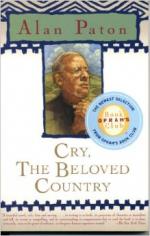|
|
Cry, The Beloved Country Topic Tracking: Race Relations
Book 1, Chapter 5
Race Relations 1: Kumalo and Msimangu begin to hint at something that concerns everyone in Johannesburg: racial injustice. White people prosper while black people live in poverty, and many black people have become criminals. Msimangu argues that, even though white people forced black people into poverty, they are not responsible for the terrible ways that many black people have responded to this injustice. He seems to say that black people must take responsibility for their own situations.
Book 1, Chapter 8
Race Relations 2: Msimangu and Kumalo are awed to see white people helping black people so openly. They feel a mixture of hope and fear: they want to believe that things can change, but they also realize how ruined their country is. They know that if anything can help South Africa, it is these individuals, acting alone, out of a sense of justice that does not concern itself with race.
Book 1, Chapter 9
Race Relations 3: There are so many poor black people in the Johannesburg area that they must move to a makeshift town called Shanty Town, where the buildings are so flimsy that they could not stand the rain or winter. South African whites have created this poverty, and now they have no idea how to solve it, and black South Africans now seem to have little choice but to live in poverty or turn to crime (most likely both.)
Book 1, Chapter 11
Race Relations 4: South Africa is clearly troubled, and one cannot deny that a major part of this trouble is racial. Arthur Jarvis was a rich white man who tried to help the poor black people of his country, but he was still a rich white man nonetheless, and was killed for his money. No matter how much Arthur might have wanted the same things as his killers, their different races stood between them.
Book 2, Chapter 19
Race Relations 5: James and Arthur were divided about "the native question," as are John Harrison and his father. But James is still proud of how many people, of both races, loved and respected his son. He can see that this goes beyond any single issue.
Book 2, Chapter 20
Race Relations 6: Arthur articulates what many people in the book think about: all the reasons for South Africa's current state. He acknowledges that much of it has to do with race, and argues that white people are largely responsible for the destroyed tribes and the "wicked" natives.
Book 2, Chapter 21
Race Relations 7: Arthur exposes the two-faced religious viewpoint that has allowed white people to enslave black people in South Africa for so long. He proclaims that they cannot hide behind the idea that black people were meant to be servants, when it is so clear that it is white people, not God, who has made them so.
Book 2, Chapter 23
Race Relations 8: Racial tensions are heightened whenever the great wealth of South Africa is discussed. White people own stocks, controlling the gold that black people dig from the mines. Many of these white people are so greedy and insulated that they do not even realize that the people who bring them their gold are too poor to buy any shares of it. Thus, the greatest piece of the South African economy depends on racial inequality.
Book 2, Chapter 26
Race Relations 9: Even though John Kumalo has very little to say-he is not prepared to actually lead a revolution-the white government has let him know without a doubt that, if he were to make trouble, they would put him away immediately. The two races are standing on opposite sides of a canyon, and the white policies have arranged it so that they will never meet in a peaceful or orderly way. Any black person who wants change will have to fight for it.
Book 3, Chapter 35
Race Relations 10: Kumalo rejects ideas of race and politics in his discussion with the young teacher. He only wants people to love each other, instead of being ambitious and greedy, trying to crush others with their power. When he looks at people as individuals, rather than members of a race (the teacher sees Jarvis as "the white man," while Kumalo only sees a kind friend) Kumalo is able to utterly reject racism.




